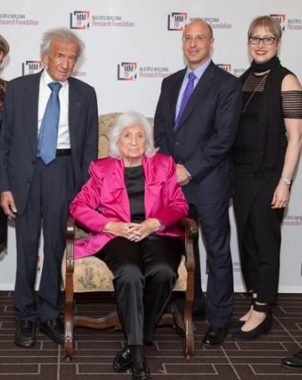Posted on May 18, 2017 at 9:47 am
Elie Wiesel’s family-approved obituary calls “Night” a novel
By Carolyn Yeager

Wiesel family attends a fund-raising event for Multiple Myeloma cancer in Oct. 2015. Left to right: Elie Wiesel, wife Marion Wiesel (seated), son Elisha Wiesel, daughter-in-law Lynn Bartner-Wiesel. (Hit Ctrl and + key several times to enlarge image)
The Wiesel obituary published at Legacy.com, affiliated with funeral homes and newspapers across America, states in it’s first sentence:
Elie Wiesel, the Nobel Peace Prize-winning author who told the story of his Holocaust internment in his autobiographical novel “Night,” died July 2, 2016.
It also said: “Wiesel called ‘Night’ his ‘deposition,’ noting that it was a true story, though parts of it were fictionalized.”
So is this the final word from Mr. Wiesel on his legacy? When do we know which of the varying statements put out by Wiesel and his surrogates is the official one?
When I was checking the conflicting personal information about survivor Paul Argiewicz for my first article about Paul, I found his obituary at Legacy.com to be the most accurate in giving the true facts. Paul was a man who continually told lies and changed his story, particularly when it came to his age at the time certain key events occurred. So I think that is relevant to determining the truth of another survivor (Wiesel) who also has a record of changing details of his story. Wiesel and his wife Marion even re-translated Night for a new 2006 edition, in order to change quite a number of elements in his story that were not consistent with other elements, or with the officially accepted narrative as it’s come to be.
This obituary was probably written by a close family friend or retainer – Jewish, of course – and approved by the family. I believe it is considered a grave sin in Hasidic Judaism to lie about your ancestors, especially your father and mother, which is why it’s necessary for your published obituary to be truthful. But also, when in the state of grief for your loved one’s passing, most people want to write accurately about them and not indulge in lies and fabrications that might have seemed acceptable at other times. It’s interesting, in light of this, to see how these “facts” have been handled here.
The obit tells us that the events that followed Wiesel’s arrival at Auschwitz-Birkenau are “well known to the public” because “Wiesel dramatized them in “Night.” To dramatize doesn’t mean to make a careful record of just what one remembers, but to adapt a story so as to express it more emotionally, or strikingly, or in an exaggerated way for literary purposes. It’s also true that Night was edited so much, it was as much the product of Francois Mauriac and Jérôme Lindon, his editor, as it was of Elie Wiesel.
It is almost always said that after the family arrived at Birkenau, Wiesel’s mother Sarah and ten-year old sister Tziporah were sent in a different direction than his two older sisters – in fact, specifically to a “gas chamber” where they were immediately murdered. But here we are told that “Wiesel and his father were separated from his mother and three sisters.” Period. Nothing more. It eventually goes on to say: “He was reunited with two of his sisters after the war, but he never saw his third sister or his mother again – they died in their own concentration camp.” They could not bring themselves to repeat the invention that the two died at Auschwitz, for which there is no evidence whatsoever, so they are left with just saying they died somewhere, somehow because they were not seen again.
I have been pressing these points for a long time, but the complicit mainstream media and holocaust hacks irresponsibly repeat the false account that Elie’s mother and sister were sent immediately to a (non-existent) homicidal gas chamber at Birkenau for “extermination.”
The obit, however, does not clarify the very confusing story concerning the writing in Yiddish of the precursor to Night.
“Night” offered a stark portrayal of genocide. Amazingly, the deeply unsettling narrative was heavily edited, reduced from Wiesel’s original 862-page manuscript to a taut, terrifying 245 pages, published in 1958 in France and translated into English for U.S. readers in 1960.
This is misleading, in that the 862 pages and the 245 pages were both in Yiddish. When the 245 pages were translated into French, it became a small book of 178 pages. The English translation was only 116 pages. Wiesel wrote about 50 more books after that and all were short (except for his official autobiography, but it is made up of individual snippets of ‘memory’). So it’s a little hard to imagine that the original manuscript was his, especially since he said he wrote the entire thing from scratch during a ship’s passage between Israel and Sao Paulo, Brazil. Of course, no one has ever seen the alleged 862 page manuscript to even verify its existence. See “The Truth about Night; Why it’s not Elie Wiesel’s Story”
Categories Featured | Tags:


Leave a Reply
By submitting a comment here you grant Elie Wiesel Cons the World a perpetual license to reproduce your words and name/web site in attribution. Inappropriate or irrelevant comments will be removed at an admin's discretion.